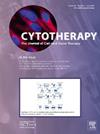Outcome of donor lymphocyte infusion after allogeneic hematopoietic stem cell transplantation in relapsed myelodysplastic syndrome
IF 3.7
3区 医学
Q2 BIOTECHNOLOGY & APPLIED MICROBIOLOGY
引用次数: 0
Abstract
Background aims
Allogeneic hematopoietic stem cell transplantation (HSCT) improves outcomes for myelodysplastic syndrome (MDS) patients, but relapse rates remain high, and postrelapse treatment options are limited. Therefore, this study aimed to identify the factors contributing to the response to donor lymphocyte infusion (DLI) in relapsed MDS patients post-HSCT.
Methods
This study included 107 patients with relapsed and DLI-treated MDS who underwent their first HSCT between 2002 and 2022 and were registered in the Transplant Registry Unified Program. Univariate and multivariate survival analyses were conducted using log-rank tests and Cox proportional hazards models. Overall survival (OS) and response rates to DLI were also analyzed.
Results
The 1-year OS was 30.0% and univariate analysis identified poor prognostic factors: age ≥58 years (P = 0.003), complex karyotype (P = 0.026), hematologic relapse (P = 0.026) and early relapse (P = 0.004). Azacitidine plus DLI also improved prognosis (P < 0.001). Multivariate analysis confirmed age ≥58 years, hematologic relapse, and early relapse as poor prognostic factors. The adjusted OS for patients aged ≥58 years who relapsed <110 days post-transplant showed that the 1-year OS in patients with cytogenetic/molecular relapse was 43.6%, compared to 9.4% for those with hematologic relapse. Acute graft-versus-host disease (GVHD) occurred in 62.3% of patients, and chronic GVHD in 30.8%, with manageable outcomes.
Conclusions
DLI may improve OS in younger patients, those with cytogenetic/molecular relapse, and those with late relapse. Despite the risk of GVHD, its impact on prognosis is minimal. Given the limited treatment options, DLI should be considered for relapsed MDS patients post-HSCT.
骨髓增生异常综合征复发患者接受异基因造血干细胞移植后输注供体淋巴细胞的效果。
背景目的:异基因造血干细胞移植(HSCT)改善了骨髓增生异常综合征(MDS)患者的预后,但复发率仍然很高,复发后的治疗方案也很有限。因此,本研究旨在确定导致造血干细胞移植后复发MDS患者对供体淋巴细胞输注(DLI)反应的因素:本研究纳入了107例复发且接受过DLI治疗的MDS患者,这些患者在2002年至2022年间接受了首次造血干细胞移植,并在移植登记处统一项目中登记。采用对数秩检验和Cox比例危险模型进行了单变量和多变量生存分析。同时还分析了总生存期(OS)和对DLI的反应率:1年OS为30.0%,单变量分析发现了不良预后因素:年龄≥58岁(P=0.003)、复杂核型(P=0.026)、血液学复发(P=0.026)和早期复发(P=0.004)。阿扎胞苷联合 DLI 也能改善预后(P < 0.001)。多变量分析证实,年龄≥58岁、血液学复发和早期复发是不良预后因素。年龄≥58岁复发患者的调整后OS 结论:DLI可改善年轻患者的OS:DLI可改善年轻患者、细胞遗传学/分子学复发患者和晚期复发患者的OS。尽管有发生 GVHD 的风险,但其对预后的影响很小。鉴于治疗方案有限,HSCT 后复发的 MDS 患者应考虑使用 DLI。
本文章由计算机程序翻译,如有差异,请以英文原文为准。
求助全文
约1分钟内获得全文
求助全文
来源期刊

Cytotherapy
医学-生物工程与应用微生物
CiteScore
6.30
自引率
4.40%
发文量
683
审稿时长
49 days
期刊介绍:
The journal brings readers the latest developments in the fast moving field of cellular therapy in man. This includes cell therapy for cancer, immune disorders, inherited diseases, tissue repair and regenerative medicine. The journal covers the science, translational development and treatment with variety of cell types including hematopoietic stem cells, immune cells (dendritic cells, NK, cells, T cells, antigen presenting cells) mesenchymal stromal cells, adipose cells, nerve, muscle, vascular and endothelial cells, and induced pluripotential stem cells. We also welcome manuscripts on subcellular derivatives such as exosomes. A specific focus is on translational research that brings cell therapy to the clinic. Cytotherapy publishes original papers, reviews, position papers editorials, commentaries and letters to the editor. We welcome "Protocols in Cytotherapy" bringing standard operating procedure for production specific cell types for clinical use within the reach of the readership.
 求助内容:
求助内容: 应助结果提醒方式:
应助结果提醒方式:


